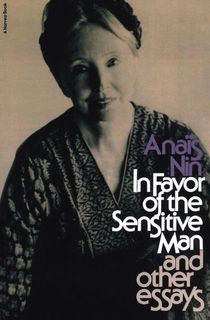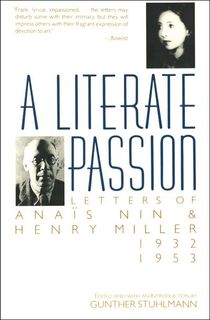Anaïs Nin (1903-1977), as both an author and as an individual, is a base breaker. Besides being both directly and indirectly responsible for the end of many relationships, she is also the center of an ongoing argument over whether or not she was actually a decent, notable writer beyond her infamous erotica and diaries. The public adores reading about Nin’s countless scandalous love affairs, fictionalized into delicious short stories or confessed in her published journals, but for some, that is as far as her attraction as a writer stretches.
The questions continue to be asked, debated, and unconcluded. Did Anaïs Nin have real talent, or was her merit merely in her shock factor? Did she have versatility or was she something of a one-trick pony? Here are three books of Anaïs Nin’s non-erotica and non-diary writings that act as material evidence for the case in her favor. Depending on the takeaway of each individual reader, these books prove that Nin was not only capable of handling topics outside of soft pornography, but she could do so masterfully.

D.H. Lawrence: An Unprofessional Study
Nin’s reputation as a literary critic is grossly underrated, likely because—excluding the occasional review to promote a new book she particularly liked—she seemed to have abandoned the genre altogether as her writing career progressed in her more trademark genres. But the humbly titled D.H. Lawrence: An Unprofessional Study, published in 1932, is worth a second look, regardless. It was her first published book and should be considered something of an adolescent sketchbook of what would become her signature style.
Here Nin, a new but ambitious author, casts herself as a champion for arguably the early twentieth century’s most controversial novelist: D.H. Lawrence. Lawrence’s Lady Chatterley’s Lover in particular, a landmine of a sex-positive novel published in 1928, made him a key figure in the ongoing war between free expression and censorship.
Nin’s debut book, famously written in a record-breaking span of sixteen days, rises courageously to Lawrence’s defense. Here Nin demonstrates not only her daring as a writer, but also as a representative of her gender. It was unheard of at the time that a respectable woman, let alone the wife of a prominent banker—at the time of writing, Nin was in a shaky marriage to Hugh Parker Guiler—would side with Lawrence.
But as Nin would demonstrate throughout her life, she carried no shame about being associated with risqué literature. In her Unprofessional Study she provides a fair, objective, and intelligent critique of Lawrence’s credentials as a writer from the point of view of an attentive reader who, unlike many of Lawrence’s adversaries, actually bothered to sit down and really read his work.

In Favor of the Sensitive Man
Anais Nin led an extraordinarily active lifestyle, and In Favour of the Sensitive Man and Other Essays, gathered together and published as a single volume in 1976, is an intriguing variety pack, offering readers a taste of everything. This collection binds together Nin’s journalistic pieces and book reviews, personal essays, interviews, and travel blurbs that were scattered across assorted magazines, journals, and newspapers and retrieved from obscurity for the purpose of introducing readers to the less sensuous and more intellectual side of her personality.
It is an exploration of Anais Nin’s domestic, social, and literary existences that, almost chastely, omits her usually commandeering sex life, which to some could be considered somewhat refreshing, especially after a binge of her erotic writings.
Readers will be treated to Nin’s account of tackling the challenge of setting up a private printing press in her own home (in defiance of the conventional publishing houses that shunned her work). They will travel with her to Japan, where she was staggeringly impressed by the nation’s luscious gardens as well as a geisha’s parlour trick of delicately removing an entire skeleton from a fish in one piece using chopsticks.
Nin also comments on modern couples who defy traditional gender roles and divide responsibilities in their relationships, and women who outright refuse to have anything to do with marriage or children. At the centre of every piece in the collection is Nin herself, refining her voice, almost sharpening it on a non-fiction whetstone in preparation for battle against an intensely transitional cultural period.

A Literate Passion
People tend to claim that letter-writing is a lost art, yet the medium survives as long as literary letter collections such as A Literate Passion: Letters of Anais Nin and Henry Miller continue to circulate the publishing world and attract enthralled readership.
In late 1931, Nin’s relatively calm and mundane existence as a suburban housewife in the French countryside experienced an earthquake when she was introduced by the vagabond writer Henry Miller, who’d fled stodgy, capitalist American to write in inspiring, bohemian Paris. While still married to Guiler, Nin met her match in Miller in every possible aspect. Encapsulated in this balding, boisterous, broke, and baseless man was Nin’s perfect soulmate, lover, collaborator, and partner in crime. The two employed their letter-writing as a means of honing their incredible talents. Not intended to be read by anyone else, their letters exchanged back and forth over the span of nearly two decades were a safe platform in which they could express themselves freely.
And express themselves freely they did. Their lengthy correspondence, swept together into a single neat volume for publication in 1987, invites readers into their private world of artistic experimentation and societal rebellion. Yes, there is much mature not-safe-for-work content, but in their letters can also be found treasured nuggets of information about their creative processes and the undertaking they jointly took of being two determined, uninhibited writers on their bellies, prepared to crawl through the debris of a post-war world.
Nin can only take credit for having wrote only half of the content of this book, but one can award her due recognition for clearly being the more poetically inclined of the relationship. Miller, though an accomplished writer in his own right, simply did not have Nin’s knack for metaphors.

